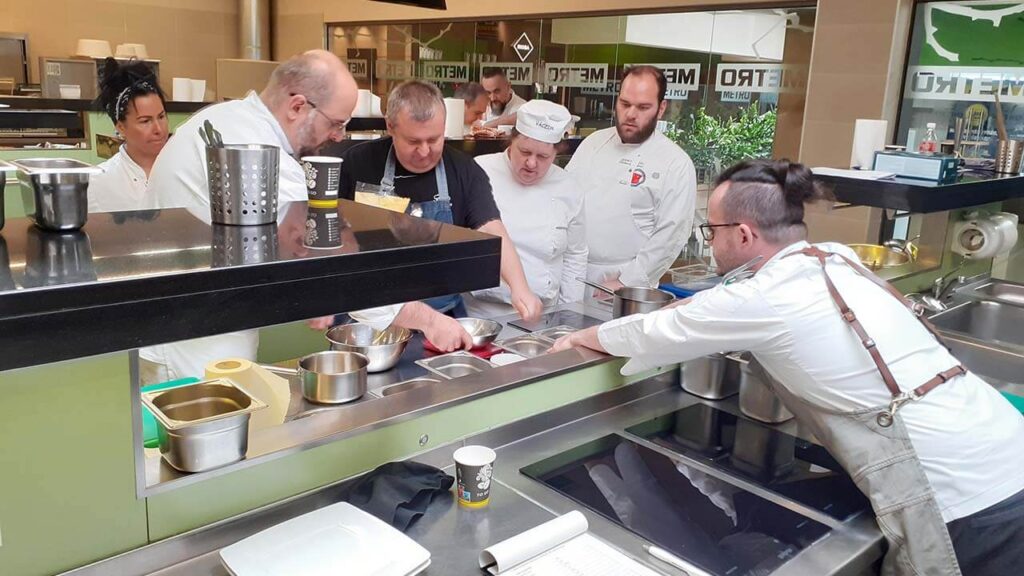
Plant-based masterclass for chefs
An old dream of ours has come true with the opportunity for professional chefs, including catering staff, to participate in a training course on plant-based catering at the METRO Gastronomy Academy. The training, entitled “Plant-based Restaurant Pastas”, held on 23 April, focused on sharing the knowledge of executive chef Gergely Zsolnay, horticultural engineer, certified nutritionist, executive chef of The Planteen in Budapest and former executive chef and manager of Flow Specialty Coffee Bar & Bistro on Andrássy Avenue, Hungary, and plant-based vargabéles.
The current vegan theme is not unique to the METRO Gastronomy Academy, as the knowledge centre regularly organises and conducts workshops and training sessions on plant-based cooking. METRO Gasztroakadémia has been a leader in promoting plant-based diets for many years, as it considers it its mission to bring Hungary up to the level of the surrounding EU countries, where it is accepted that we cannot talk about sustainability without a plant-based food industry and catering.
Vegan skewers, millet cottage cheese dumplings
The Vegetable-based Restaurant Pasta II course revolved around the classic skewers. The “cottage cheese filling” was made with boiled cologne, and the necessary threading was kneaded, stretched and cut into strips by hand. And, speaking of millet, the cooks were also able to make a savoury and sweet version of the “cottage cheese dumpling”. The savoury ones were made with toadstools and served with chicory salad, while the sweet ones were served with balsamic sauce and strawberry mousse.
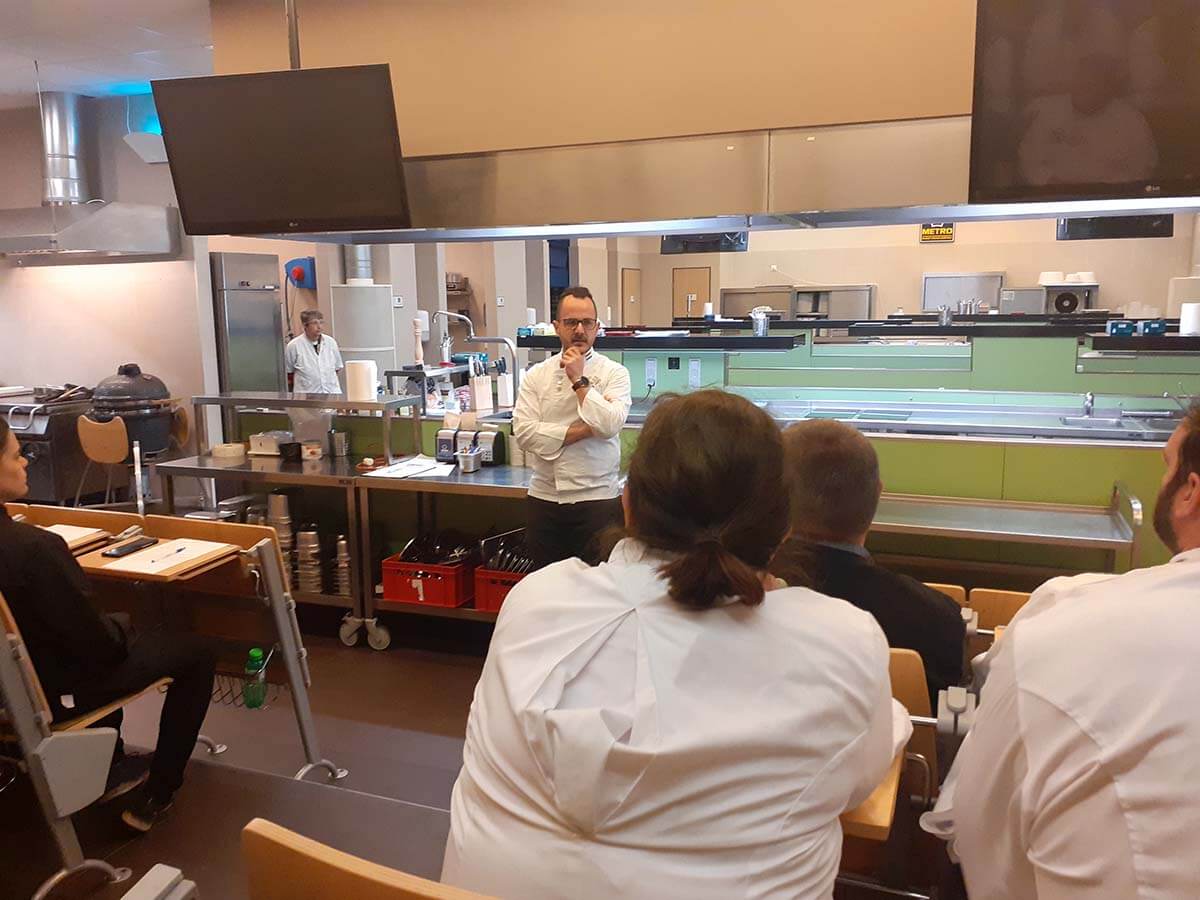
The course was attended by, among others, the chef of a vegan restaurant in a big city in the countryside, the owner of a café-bistro in the Budapest agglomeration, and chefs from penitentiary institutions from several municipalities (the training was given to the staff of the Prison Service of Vác as a special prize of the Public Catering Competition). There was also an amateur chef who works as an IT specialist but would like to hone his cooking skills at home to impress his wife.
As an introduction to cooking together, Gergely Zsolnay talked about the uses of grains and flours, the quality of pasta, how to clean and process grains, and shared a wealth of knowledge with the audience. He drew attention to the importance of seasonality in public catering and restaurants, and pointed out that the sector has a responsibility to shape quality and price, and that by using fruit and vegetables out of season they are actually risking their own future supply of quality ingredients.

Why is it important to have a plant-based option in catering and hospitality?
He also stressed the importance of making sure that customers everywhere (in catering and other hospitality outlets) have a plant option. On the one hand, because more and more people are living a meat-free diet of one kind or another, and on the other hand, many of those who do not consider themselves vegetarian, vegan or flexitarian are happy to choose a plant-based meal on occasion. Around 95% of the clientele in vegan restaurants are non-vegans. Many of them are regular visitors, while at home they eat a mixed diet.
Gergely Zsolnay also pointed out that it is easier to educate a few thousand public caterers than the population as a whole, and that they can use the domino principle to bring a new, sustainable, healthier approach to families, workplaces and communities.
If it were commonplace for every restaurant and catering outlet across the country to offer a vegetable option, not just tofu sprinkled with salt and pepper and quickly tossed in oil, but a more delicious, exciting dish, many more people would order it. If there is only one vegetable option in 100 restaurants, it won’t reach people’s taste buds, but if they come across it everywhere, they will be curious and try it.
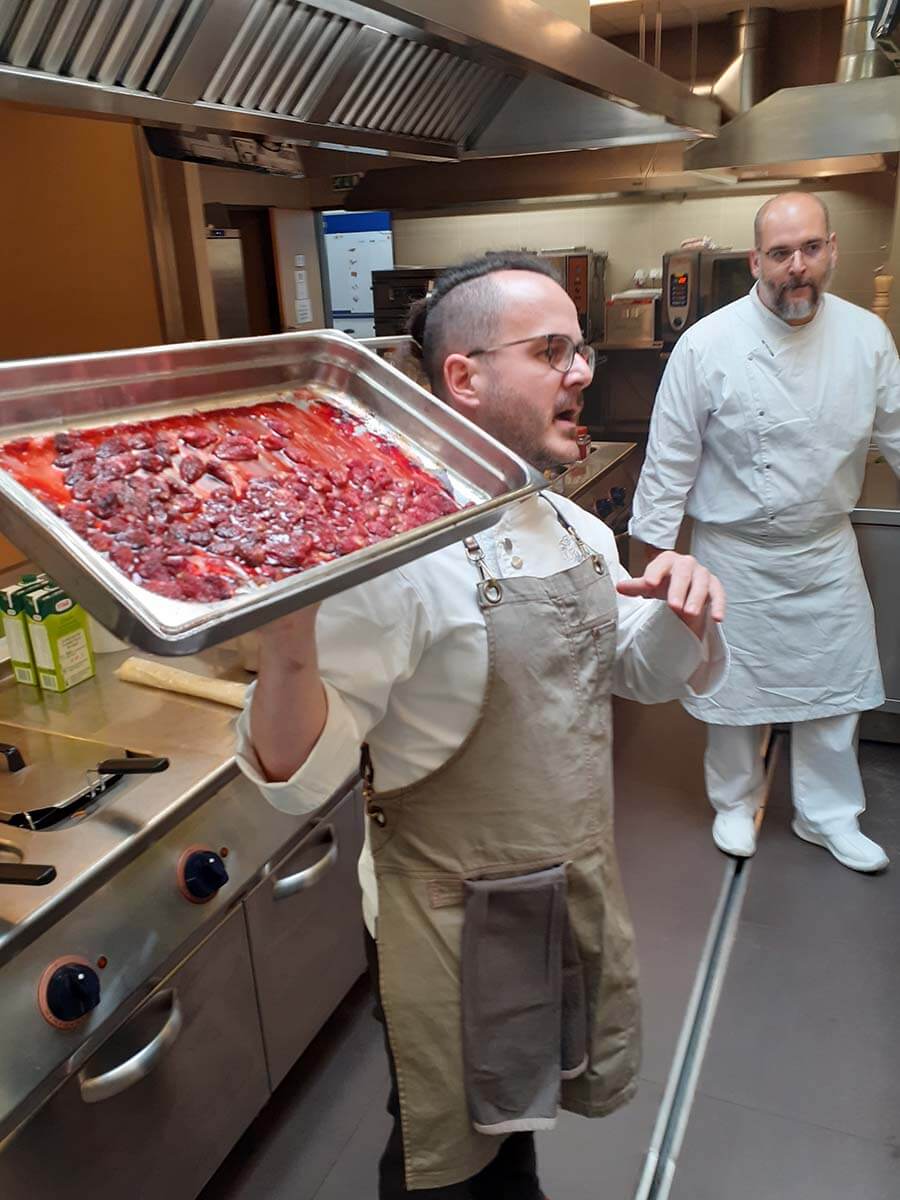
Coming back to the main ingredient of the day, millet, he said that while the price of 1 kg of cottage cheese is 3500-4000 HUF, the price of 1 kg of millet is about 1000 HUF. Cottage cheese loses water during cooking and baking, so the final quantity that can be used will be less than 1 kg, while millet absorbs water at a rate of 2-2.5 times. So for a kitchen with a large number of people, it is more economical to use this raw material more and more often, in addition to the other benefits.
For our interview with Gergel Zsolnay on the training course on plant-based diets and the introduction of plant-based options in restaurants, click here.
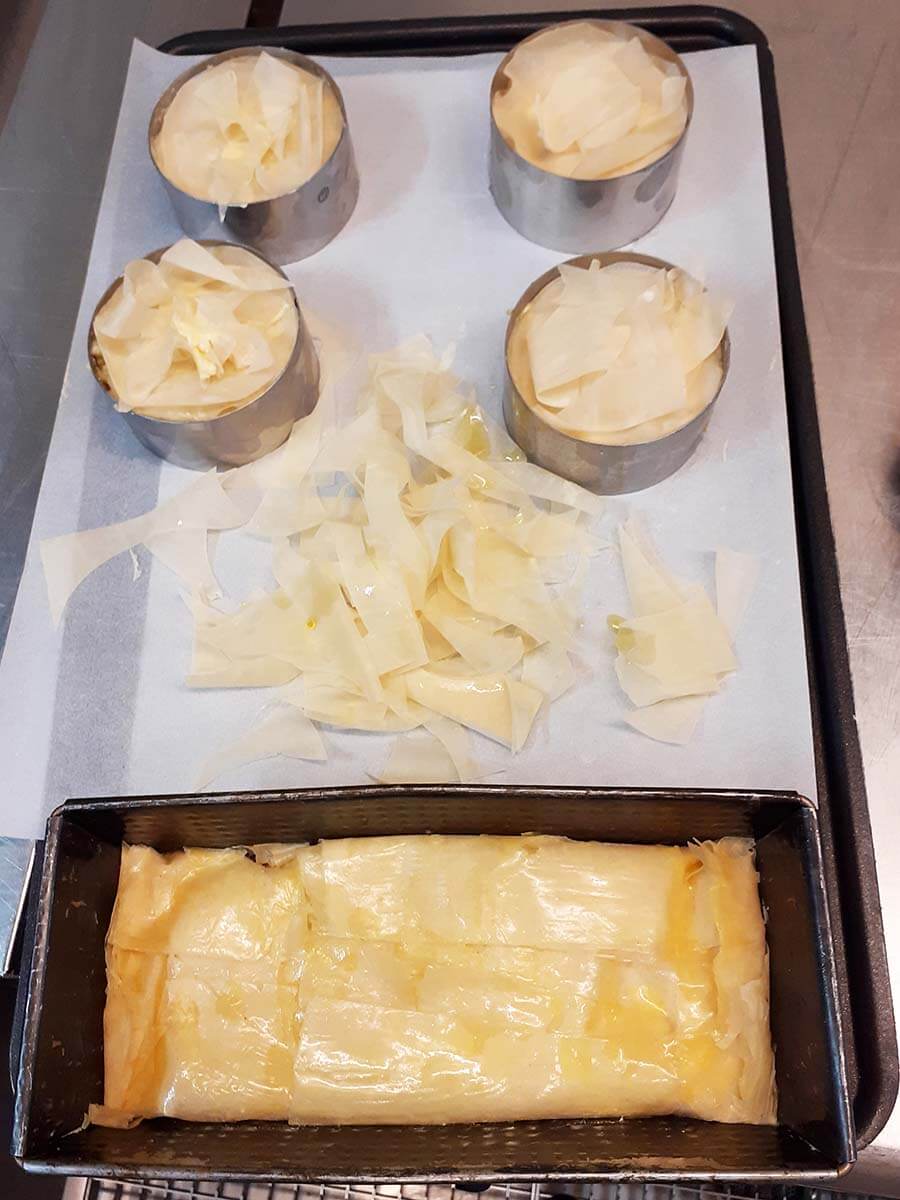
Participants’ impressions
Mónika Néderné Katus from the Váci Prison Institute participated in the course. While she was suspiciously measuring the consistency of the cottage cheese substitute millet cream stirring in the pan, we asked her how much more difficult it was for her to cook with a vegetable base.
“We’re working with ingredients now, including millet, wholemeal flour, lettuce, which are not common in our country. And this way of using it is not common either. I wouldn’t say it’s harder to cook this way, but rather more interesting. It’s a bit of a challenge, because we don’t have a reference point for how it should be.
In our prison, there would be a riot among the inmates if they were given non-meat food, although there are some vegetarians among them. Where we will be able to apply the knowledge we have acquired today is more in the area of staff catering. They are more open to a plant-based diet. When we tried the menu in preparation for the public catering competition, we cooked it and tasted it at the institute. They came, tasted it, gave their opinions and advice. They also asked how it could be incorporated into the menu of the institute itself. So they are receptive to it, and that’s why Gergő and I want to work together a little bit, to make the staff as familiar as possible with this possibility and with the fact that it’s not a devil’s play to have a meat-free day. I always use the example of our grandparents not eating meat every day. In the winter, they had the pig slaughter, and they ate it while it lasted. Other than that, there were potatoes, onions and the old Hungarian apple varieties that could be stored in the pantry for the winter. There were no tomatoes or peppers all year round. They really ate what nature and the home garden gave them.
I think there is a justification for what Ervin and Gergő stand for, but it is important not to force people to do it, but to take small steps and show them the benefits. Showing that it can be a tasty, good experience.”
said Mónika.
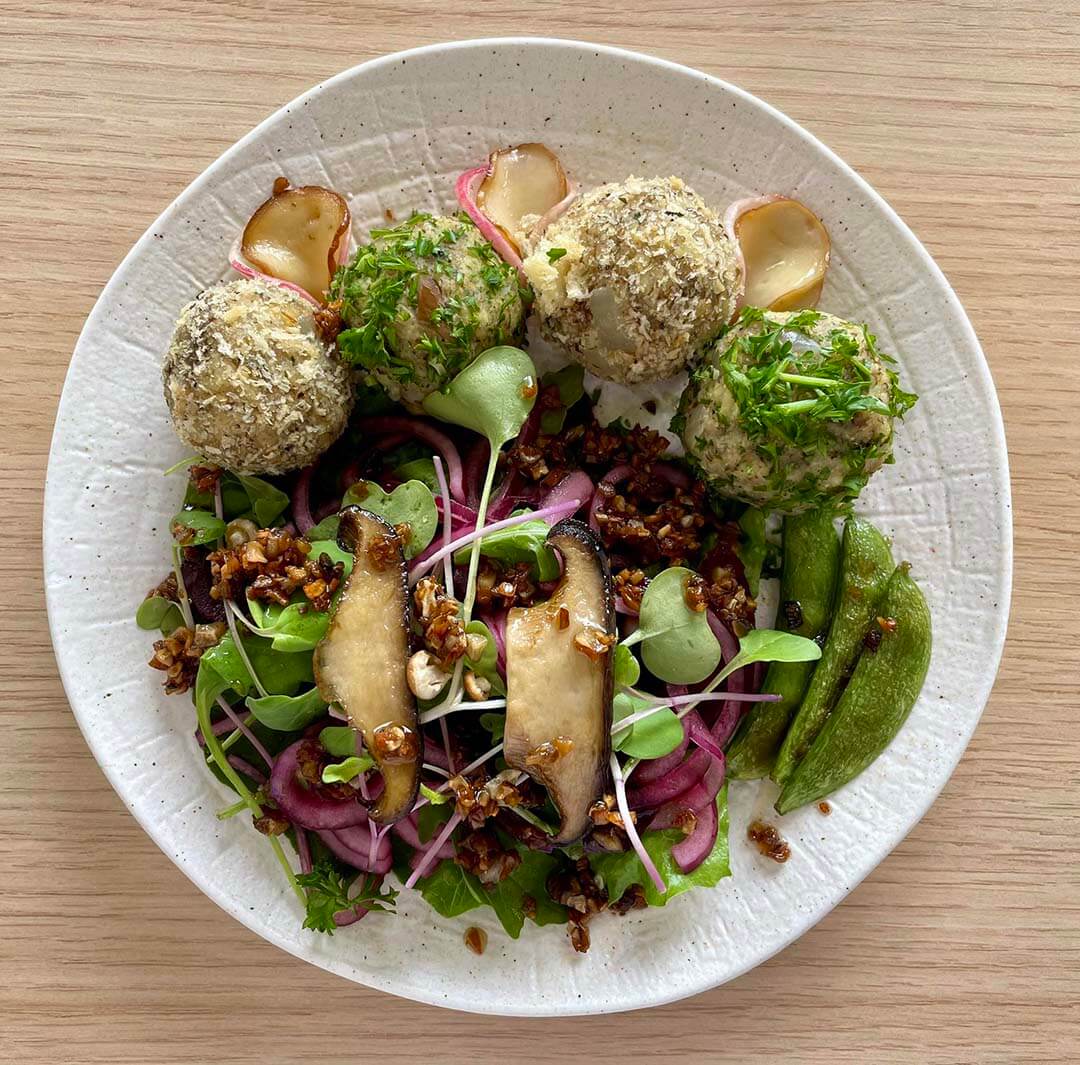
Interaction between the speaker and the participants is important
István Gálicz is the chef and programme designer of the METRO Gastronomy Academy, which is providing the venue. METRO Gasztroakadémia is organising more and more cooking courses on plant-based diets, István said:
“Since the academy started, one of our main goals has been to help hospitality professionals in as many areas as possible. This beautiful large kitchen is one of the easiest and most usable bases for this. We try to meet all kinds of trends, we try to help all kinds of styles. We offer training in a wide range of subjects from street food to fine dining. Wherever we see the world going, we also try to anticipate it with cooking classes.
Nowadays, plant-based eating is becoming more and more common around the world, and the demand for free-from eating is also growing. Although the vegan lifestyle is typically a diet of choice, partly driven by sustainability and awareness, it also harmonises well with diets demanded by various food intolerances and allergies. The fact that more and more people are living with different views on different meat-free diets is not a new trend, but there is a growing demand for it, and unfortunately the schools (where chefs are trained) are still in their infancy in teaching it. And for those who have been trained in the past, it has been almost completely left out. Fried cheese breaded in beaten eggs and mushroom caps stuffed with cream cheese were the meat-free offerings.
There are now 10-12 participants, so there is interest among the trained chefs. We don’t even like to allow large groups, because if there are too many people, there is not enough attention for one participant and the course becomes impersonal. And in today’s world, impersonal information can be obtained on the internet. We like to keep the contact and interaction between the presenters and the participants. This way, the instructor can even give immediate advice on mistakes, telling you what to look out for next time. You will never find that out from a recipe video.”
Gergely Zsolnay will hold the 3rd course in the series in June, and further plant-based cooking workshops and training courses are also available at the METRO Gastronomy Academy.